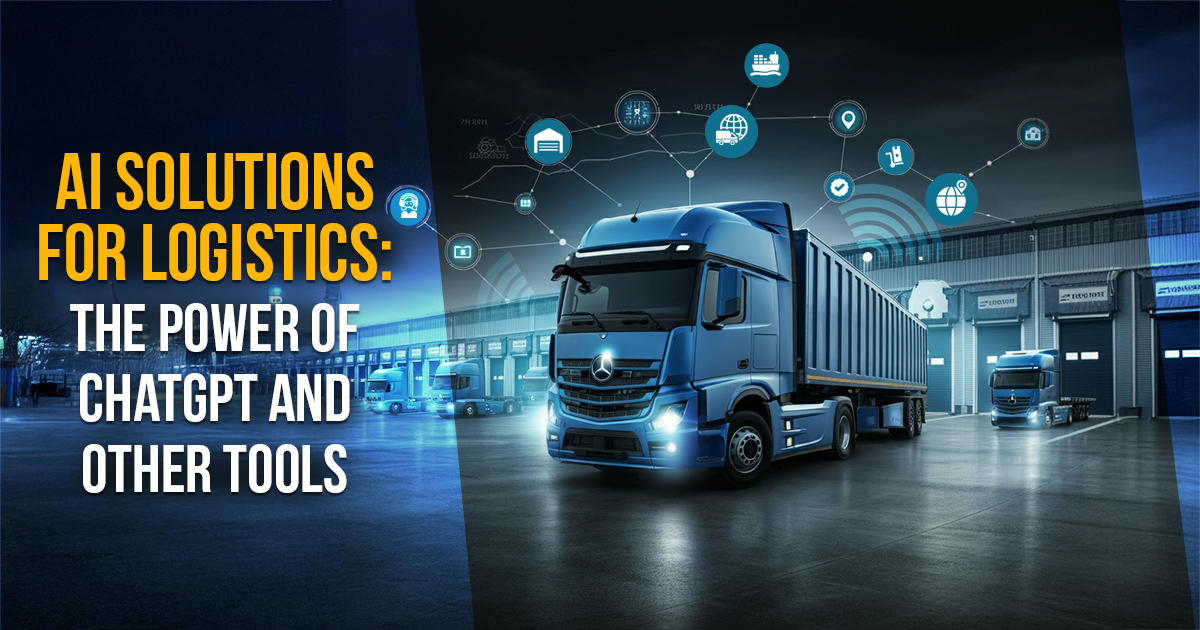
The logistics in the Philippines is getting a major upgrade thanks to AI. Local companies are embracing smart technologies to streamline everything from managing their supply chains to keeping their drivers safe on the road, and also, for their overall operational efficiency. Learn how AI solutions for logistics particularly learning the power of ChatGPT, will do logistics in today’s advancements.
Understanding AI Evolution in Logistics Through Hybrid Formats
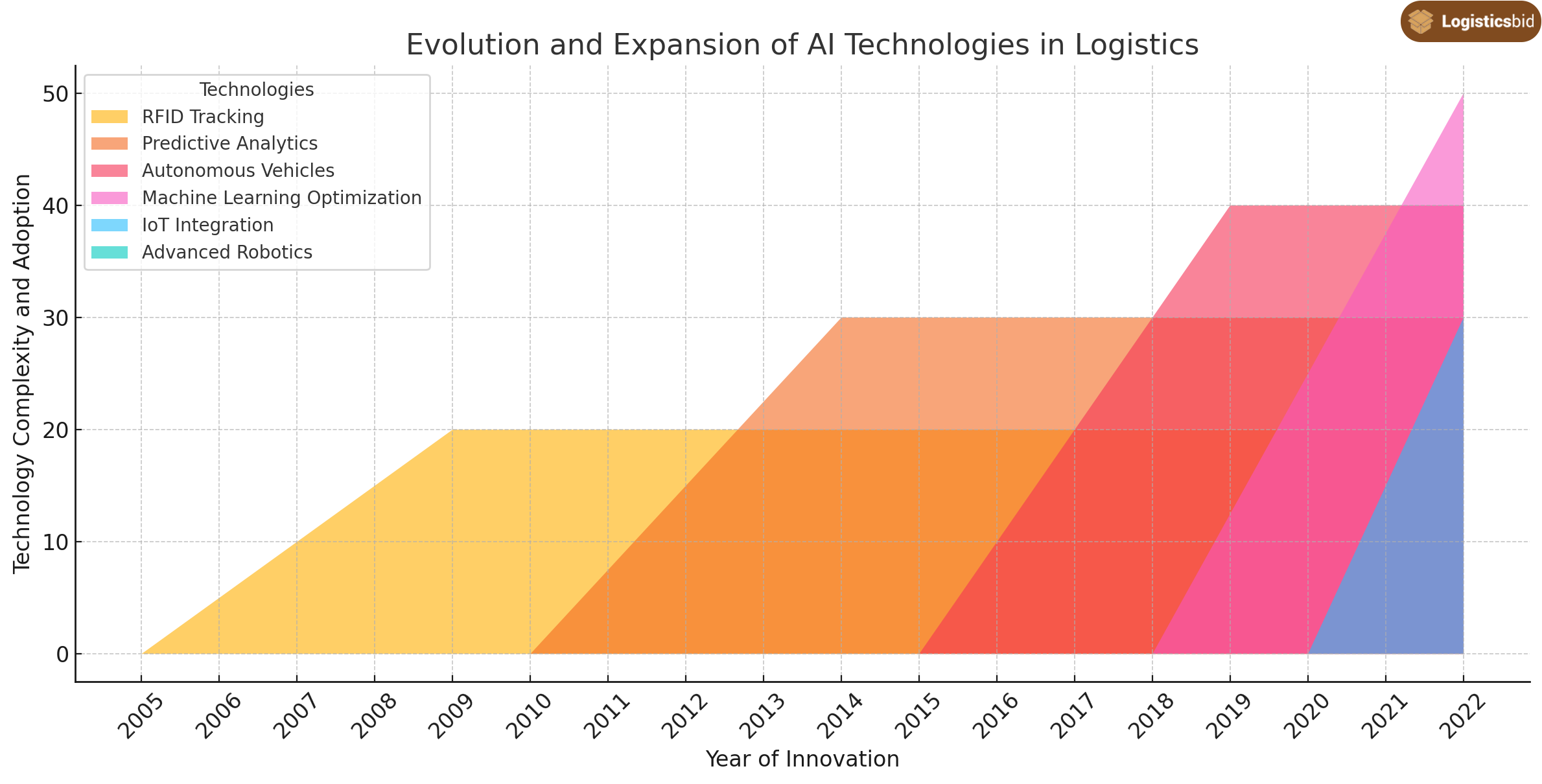
The evolution of AI technologies in logistics can be understood as a hybrid of functional and chronological formats, akin to a combination resume that highlights relevant skills alongside a professional narrative. This approach allows stakeholders to both scan for specific keywords and appreciate the broader context of technological advancements in logistics.
From Predictive Analytics to Smart Routing
As AI develops, its uses go beyond logistics management to include improved routing and predictive analytics. AI’s ability to predict demand trends and optimize inventory management is really going to have a significant positive impact on the logistics industry, increasing overall operational efficiency.
AI’s Growing Market in Logistics
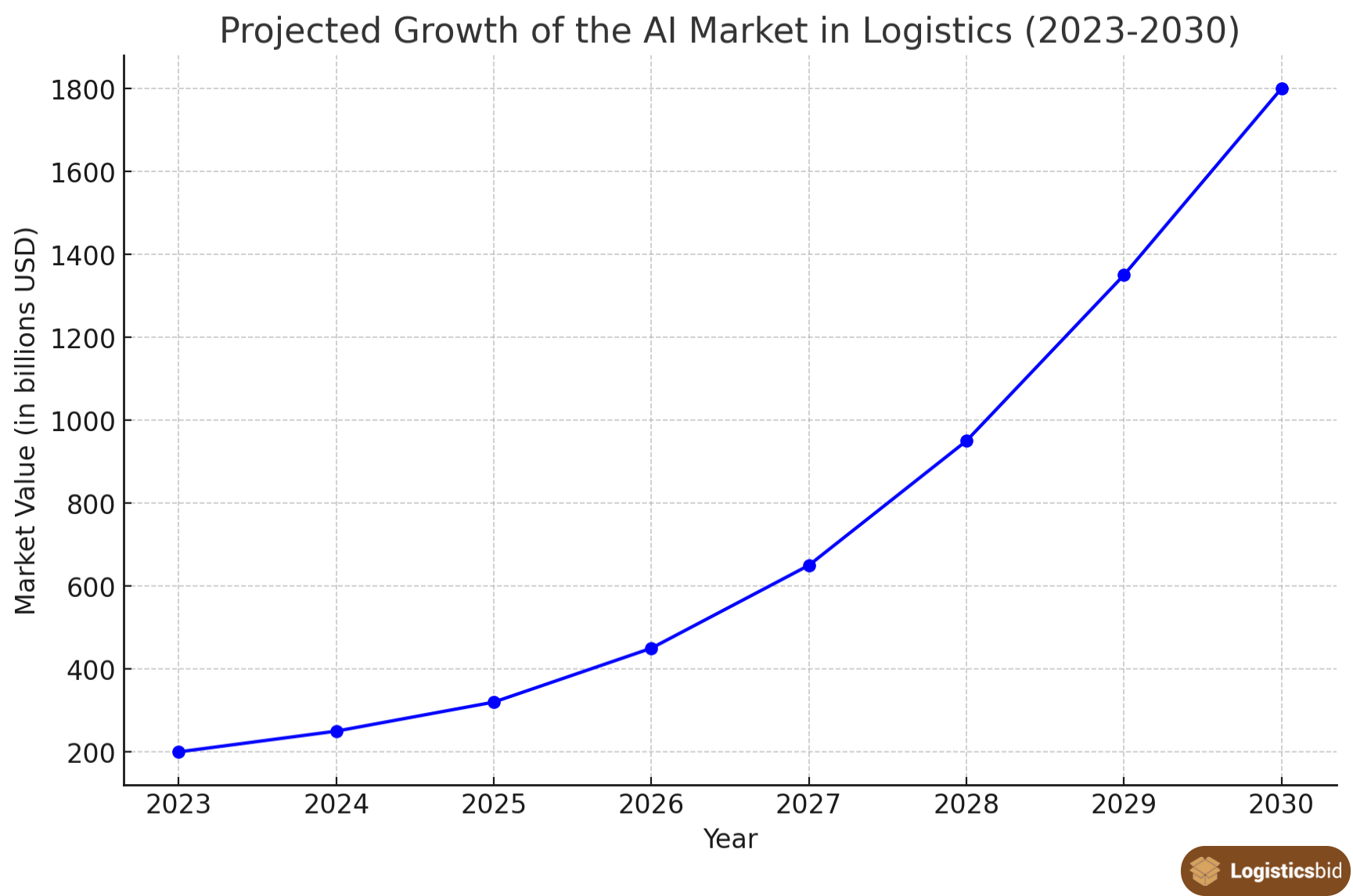
According to predictions presented on the graph above, the logistics AI market is expected to rise significantly from $200 billion in 2023 to over $1.8 trillion by 2030.
Challenges in AI Adoption: Aligning Expectations with Reality
Adopting AI in logistics is not without its difficulties, though. According to a study, misplaced expectations and discontent with AI deployments can result from insufficient pre-adoption procedures and a lack of internal competence.
Exploring Power of ChatGPT’s Role in Modern Supply Chain Management
Launched in late 2022, ChatGPT is an advanced conversational artificial intelligence (AI) system created by OpenAI that has quickly become a major player in a number of industries, including supply chain management and logistics. This allows it to provide thorough and instantaneous answers to user questions.
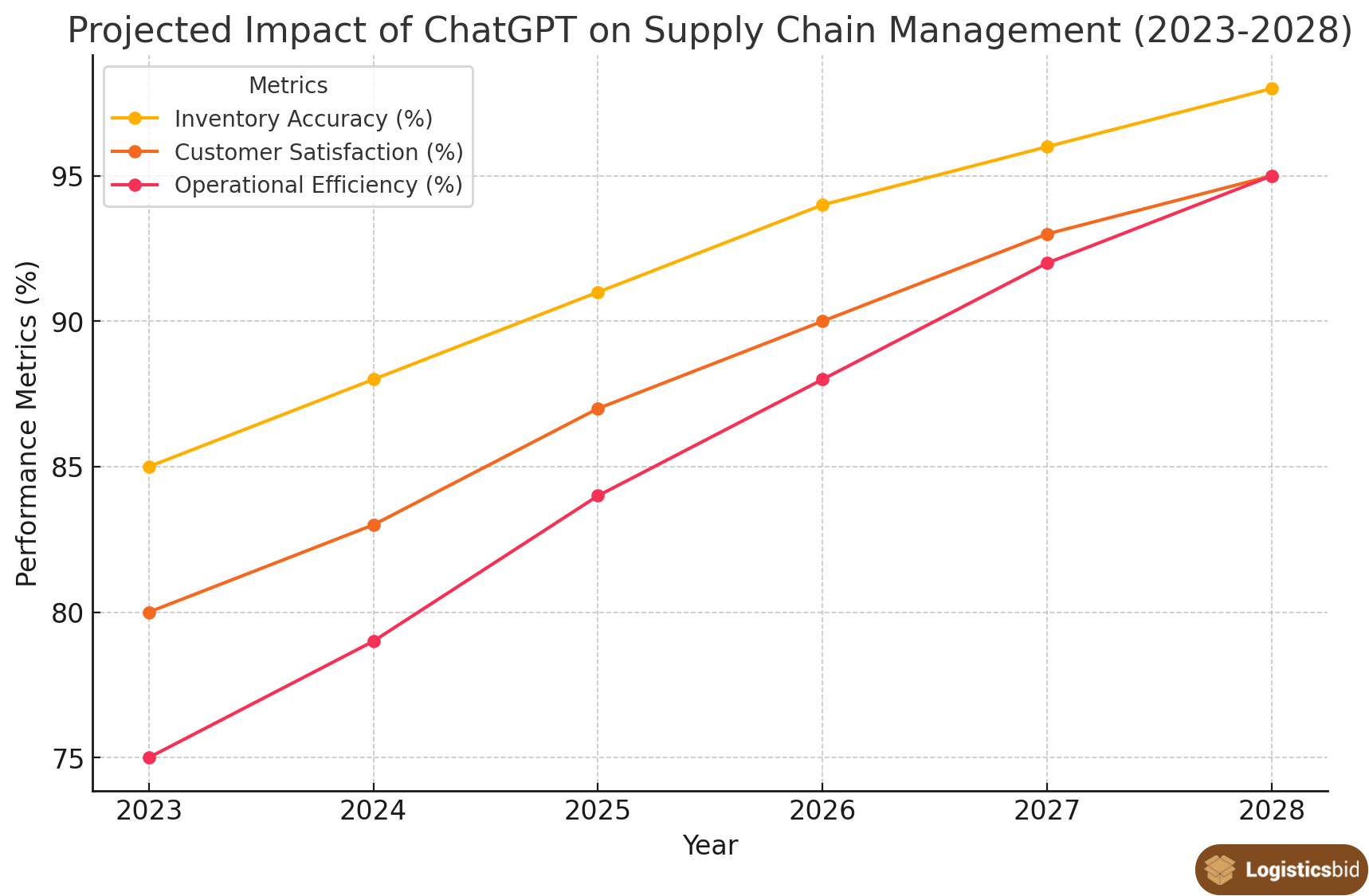
Here’s the graph depicting the projected impact of the power of ChatGPT integration into supply chain management from 2023 to 2028. It shows improvements across three key performance metrics:
- Inventory Accuracy (%): Increasing accuracy in inventory levels due to predictive analytics.
- Customer Satisfaction (%): Enhanced satisfaction through improved customer service automation and response times.
- Operational Efficiency (%): Overall efficiency gains from better decision-making and simpler procedures.
Enhancing Supply Chain Operations with Integrated AI Technologies
The integration of ChatGPT with other cutting-edge technologies, such blockchain and big data analytics, has significant advantages for supply chain process optimization. For instance, it can be used in conjunction with data analytics tools to improve the automation of supplier selection based on real-time market data and offer insights for better decision-making.
Navigating the Benefits and Challenges of AI in Logistics
The introduction of the power of ChatGPT into logistics operations can lead to significant improvements in efficiency and customer satisfaction. However, successful implementation hinges on addressing critical success factors, such as ensuring information security and ethical considerations.
Diverse AI Solutions for Logistics: Beyond ChatGPT
AI solutions for logistics extend beyond ChatGPT to encompass a variety of technologies that enhance operational efficiency and decision-making. These solutions are pivotal for modern supply chain management, providing tools for predictive analytics, autonomous vehicles, and warehouse automation, among others.
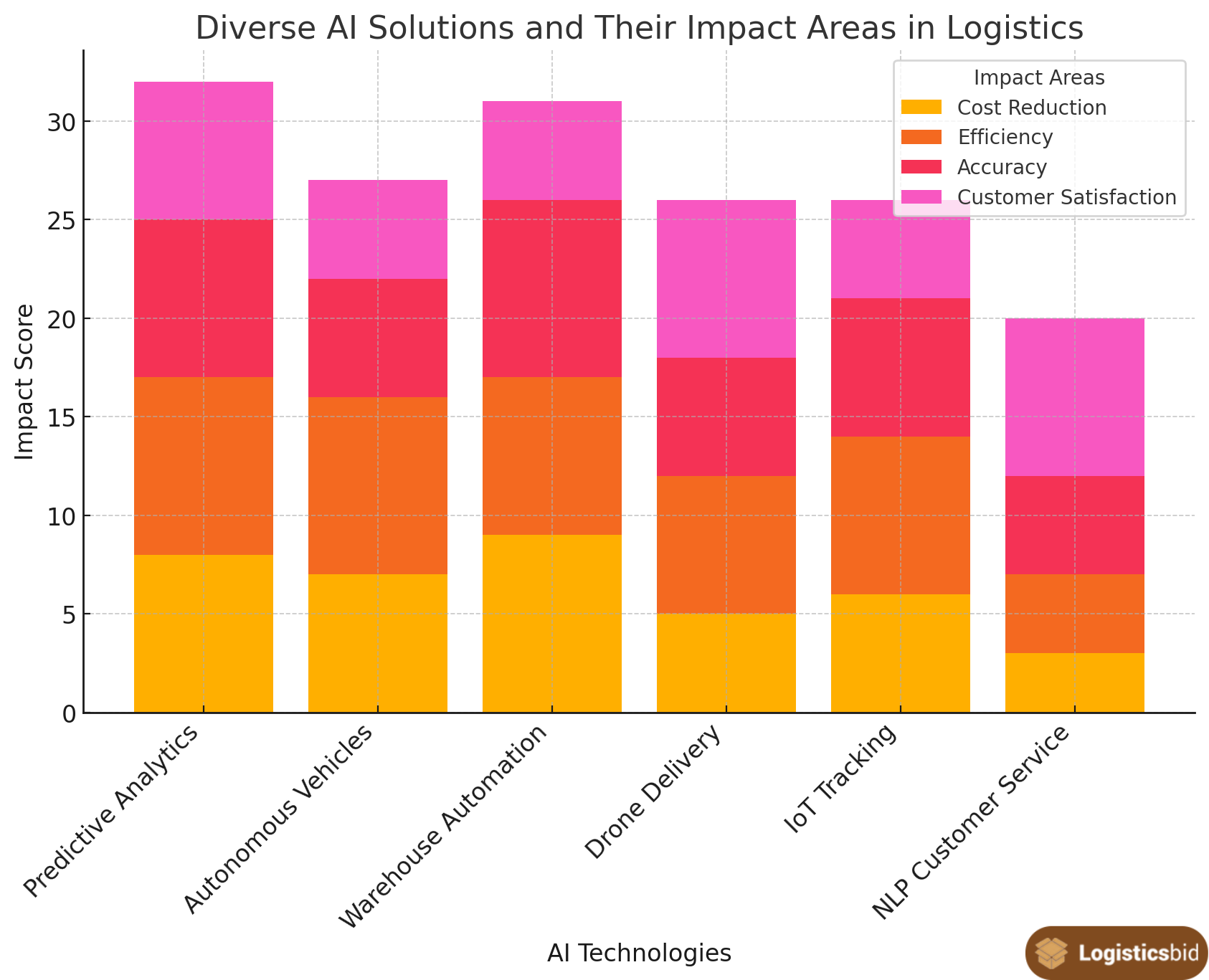
1. Predictive Analytics Software
Tools like IBM Watson offer advanced predictive analytics capabilities that help logistics companies forecast demand, manage inventory levels, and anticipate potential delays or disruptions.
2. Autonomous Vehicles
These robots autonomously navigate through warehouses to pick, sort, and move goods, increasing the speed and accuracy of order fulfillment while reducing labor costs.
3. Warehouse Automation Systems
Companies like Kiva Systems (now part of Amazon Robotics) specialize in creating robotic systems for automating the picking and packing processes.
4. Drone Delivery Systems
Zipline and Wing (a subsidiary of Alphabet) have pioneered the use of drones for delivery purposes. These drones can quickly deliver goods to remote or hard-to-reach areas, providing a faster, more cost-effective delivery method that is particularly useful in emergency situations or for delivering critical supplies.
5. IoT and Sensor-based Tracking Systems
IoT devices equipped with sensors are used extensively for real-time tracking of goods and vehicles.
6. Natural Language Processing (NLP) for Customer Service
AI technologies that utilize NLP, such as Interactions LLC, provide advanced customer service solutions. These tools can automate responses to customer inquiries, track shipment statuses, and handle routine tasks, freeing up human agents to tackle more complex customer service issues.
Addressing AI Challenges: Data Quality, Integration, and Security
Data Dependency One of the primary challenges is the dependency on high-quality datasets. The effectiveness of predictive models in logistics is significantly reliant on the quality, granularity, and diversity of data utilized. Insufficient data, particularly lacking geographic or demographic insights, can impede the models’ capabilities to accurately reflect the complexities of supply chain operations across various regions. This underscores the necessity for comprehensive datasets that encompass a broad spectrum of operational contexts to improve accuracy and applicability in logistics.
Data Quality and Availability
Despite advancements in technology, logistics operations in 2023 face hurdles regarding data quality and availability. The surge in consumption channels has complicated the logistics landscape, making it difficult to maintain cost-effective and efficient delivery processes. Challenges such as last-mile delivery issues and supply chain disruptions necessitate a reevaluation of inventory distribution networks. Retailers must create seamless experiences, but achieving this is hampered by the current inadequacies in data management.
Integration Issues
Merging new AI technologies with existing legacy systems presents another significant challenge. Organizations often struggle with obsolete infrastructure and mismatched platforms, which can complicate the integration process. To mitigate disruptions during implementation, companies must emphasize seamless integration strategies. Furthermore, the selection of trustworthy technology partners is crucial for successful deployment; thorough research into potential third-party vendors is essential.
Security and Privacy Concerns
Security and privacy are major concerns associated with implementing AI solutions for logistics like ChatGPT. Ensuring data protection is paramount, necessitating robust security measures to safeguard customer information and comply with applicable privacy laws. Risks such as data breaches and potential data loss highlight the importance of prioritizing security during AI integration.
Skills Gap and Implementation Variability
A notable gap exists between the potential applications of AI in logistics and its actual implementation within companies. While many organizations recognize the possibilities that AI presents, a lack of expertise, time resources, or reluctance to invest often hinders progress. Consequently, practices vary significantly across the logistics market, with some companies effectively utilizing AI for fault analysis and early anomaly detection, while others lag behind.
AI in Philippine Logistics
AI technologies are increasingly being integrated into logistics operations across the Philippines, providing significant enhancements in efficiency, cost savings, and customer satisfaction. This section explores several case studies like:
Lalamove
 |
Lalamove‘s smart move into tech completely transformed their delivery business. By embracing AI and digital tools between 2016-2020, they didn’t just grow – they exploded, with business jumping an incredible 2000%. The tech upgrades meant customers could finally track their orders properly, get what they needed faster, and Lalamove could run things much more smoothly. Moreover, by enhancing its customs clearance processes through digital tools, Lalamove reduced the time required for these operations by up to 80%, achieving clearances in five days or less.
FAST Logistics
 |
A notable example is the FAST Logistics Group, which has implemented AI fleet dash cams to enhance logistics safety and efficiency. These dashcams utilize machine learning algorithms to monitor driving behavior and detect high-risk road conditions, significantly reducing the risk of accidents and improving fleet management.
Transportify
 |
As a tech-driven logistics company, Transportify has embraced AI to enhance its service delivery, optimize operational efficiency, and improve customer satisfaction. This technology considers variables such as traffic conditions, delivery windows, vehicle capacity, and the shortest available routes to ensure timely deliveries.
Significant advancements have also been observed in major ports such as Manila, Cebu, and Davao, where pilot projects utilizing AI systems have shown promise. These AI applications are designed to optimize container management operations by predicting vessel arrivals, optimizing berth allocations, and streamlining cargo handling processes. Initial results from these projects have demonstrated marked improvements in operational efficiency, particularly in reducing vessel waiting times, which is crucial for enhancing overall logistics productivity.
SEE ALSO:
